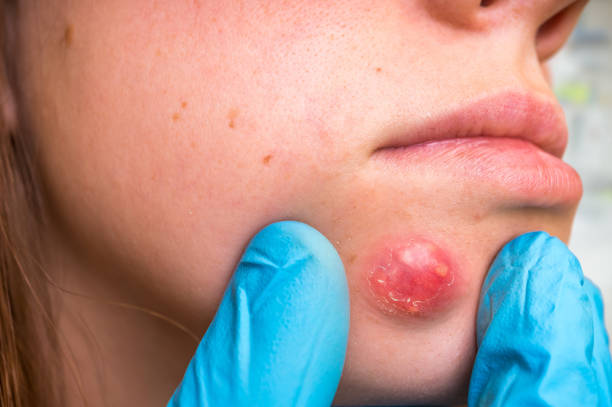
Woman with birthmark on her face, skin tags removal - cosmetic surgery
Abscess
What is an Abscess?
An abscess is a localized collection of pus within a tissue, caused by an infection. It typically forms when the body’s immune system fights an infection and leads to tissue breakdown, creating a cavity filled with pus (a mix of dead cells, bacteria, and tissue debris). Abscesses can occur anywhere in the body, internally or externally.
Types of Abscess:
- Skin Abscess (Boil): Forms just under the skin due to infection, often by bacteria like Staphylococcus aureus.
- Dental Abscess: Forms around the tooth or gums, often due to bacterial infection from tooth decay or gum disease.
- Perianal Abscess: Develops near the anus, often due to infected anal glands.
- Breast Abscess: Can develop during breastfeeding due to a blocked milk duct that becomes infected.
- Internal Abscess: Can form in organs like the liver, lungs, or brain due to infections or surgery.
- Bartholin’s Gland Abscess: Forms in the Bartholin’s glands near the vaginal opening, often due to blockage and infection.
Main Causes of Abscess:
- Bacterial Infection: The most common cause, often by Staphylococcus aureus or Streptococcus species.
- Blocked Glands: Blocked oil, sweat, or Bartholin’s glands can lead to an infection and abscess.
- Foreign Objects: Splinters or other foreign materials under the skin can introduce bacteria.
- Surgical Wounds or Injuries: An infection in a wound or following surgery can cause abscess formation.
Signs and Symptoms of Abscess:
- Swelling: A raised, swollen, and painful area on the skin or body part.
- Redness: The skin over the abscess is often red and warm to the touch.
- Pus Drainage: Abscesses may spontaneously drain pus if they burst.
- Pain: The affected area is usually tender and painful.
- Fever and Malaise: If the infection is severe or spreads, fever, chills, and a feeling of general discomfort may occur.
Risk Factors for Abscess:
- Compromised Immune System: People with weakened immune systems, such as those with HIV/AIDS, diabetes, or on immunosuppressive drugs, are more prone to infections.
- Poor Hygiene: Inadequate hygiene practices can lead to bacterial infections and abscess formation.
- Skin Conditions: Acne, eczema, or dermatitis can increase the risk of skin abscesses.
- Chronic Diseases: Conditions like diabetes and cancer can increase susceptibility to infections.
How to Prevent Abscesses:
- Maintain Good Hygiene: Regular hand washing and proper wound care are important to prevent infections.
- Treat Skin Conditions: Manage conditions like acne and eczema to reduce the risk of bacterial infections.
- Promptly Treat Infections: Seek medical care for infections to prevent them from progressing into abscesses.
How an Abscess is Diagnosed:
- Physical Examination: A doctor can often diagnose a skin abscess through visual inspection and palpation.
- Imaging Tests: Ultrasound, CT scans, or MRI may be needed to identify internal abscesses.
- Blood Tests: In cases of severe infection, blood tests may be used to assess the body’s inflammatory response.
- Aspiration: In some cases, a sample of the pus is taken for testing to determine the type of bacteria causing the infection.
Treatment for Abscess:
- Incision and Drainage: The primary treatment for a skin abscess is making a small incision to drain the pus.
- Antibiotics: Oral or intravenous antibiotics may be prescribed if the infection is widespread or severe.
- Warm Compresses: For small abscesses, warm compresses can help reduce swelling and encourage the pus to drain naturally.
- Surgery: Internal abscesses may require surgery to drain the infection, especially in severe cases or when they don’t respond to antibiotics.
Home Remedies for Abscess:
- Warm Compress: Apply a warm, moist cloth to the abscess for 10-15 minutes several times a day to promote drainage and healing.
- Turmeric Paste: A traditional remedy for its anti-inflammatory properties. Applying turmeric paste to the abscess may help reduce inflammation.
- Tea Tree Oil: Known for its antibacterial properties, diluted tea tree oil can be applied topically to help fight infection.
- Garlic: A natural antibiotic, crushed garlic can be applied to the area or consumed to support immune function.
Ayurvedic Medicine for Abscess:
- Neem (Azadirachta indica): Known for its strong antibacterial and anti-inflammatory properties, neem can be applied as a paste or used in a bath.
- Turmeric: Consumed internally with milk or water or applied externally to promote healing and reduce inflammation.
- Triphala: This Ayurvedic formula helps detoxify the body and supports wound healing.
- Aloe Vera: Soothing and healing, aloe vera can be applied topically to relieve inflammation and promote skin healing.
Precautions:
- Never try to squeeze or puncture an abscess at home, as this can spread the infection.
- Seek medical help if you notice increasing redness, swelling, pain, or if you develop a fever.
- Maintain cleanliness of the affected area to avoid further infection.
Self-Care Tips:
- Keep the affected area clean and dry.
- Change dressings regularly, especially if the abscess has been drained.
- Eat a balanced diet and stay hydrated to support immune function.
- Rest to help the body heal.
Conclusion:
Abscesses are painful, pus-filled infections that require proper treatment. While small abscesses may heal with home care, larger or more severe abscesses often need medical intervention, such as drainage and antibiotics. Preventative measures like good hygiene and timely treatment of infections can reduce the risk of developing abscesses.
Disclaimer:
The information provided here is for educational purposes only and should not replace professional medical advice. Always consult a healthcare provider for diagnosis and treatment.
Additional Tips:
- For skin abscesses, avoid tight clothing that can irritate the area.
- In case of recurrent abscesses, consult a doctor to evaluate underlying conditions like diabetes or immune deficiencies.
- Keep any wounds or breaks in the skin clean and covered to prevent infection.






